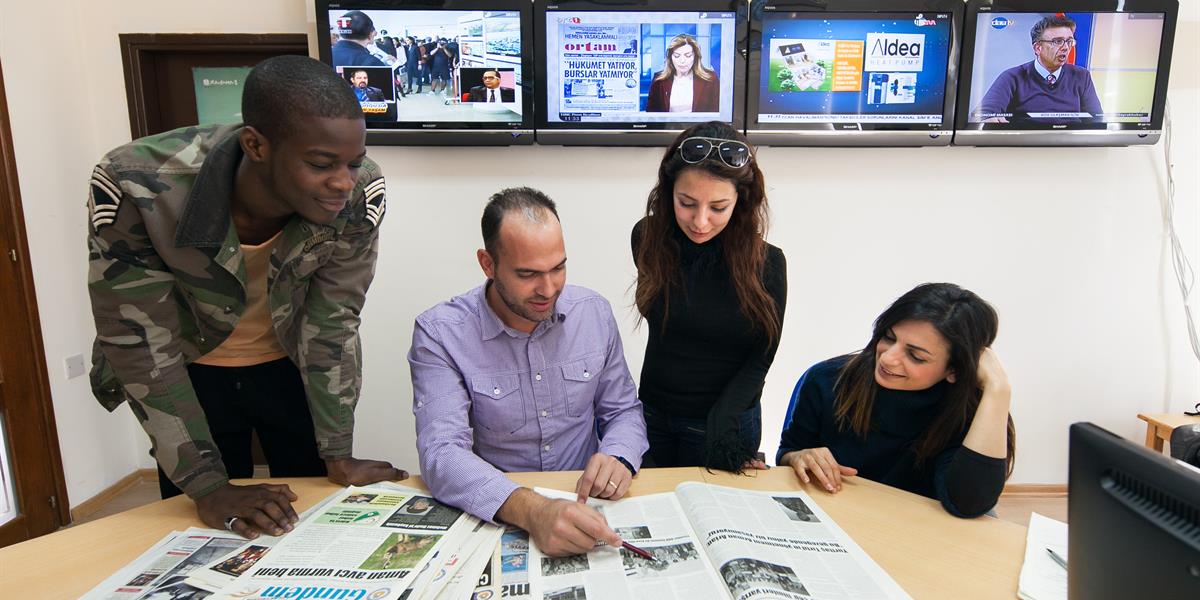
About the Department
Department of Journalism aims to train future journalists, who are determined to be ethical in the profession, equipped with social responsibility, defending the importance and necessity of freedom of press, able to analyze the current issues from a sociological, economical, cultural and political viewpoint and last but not least, become bilingual in the national/international media avenue. The Department provides the students with a multi-dimensional education and believes that theory and practice go hand in hand.
Departmental Facilities
Traditional approaches towards journalism have been changing with the latest developments in technology. Keeping this in mind, the Department constantly upgrades its curriculum and makes it more feasible for the students' expectations. For example, Desktop Publishing and Online Journalism are two courses, which would require the students to use the latest technology. Additionally, the students are able to convert their knowledge, which they have gained during courses, into practical execution at the Media Center, Gündem Newspaper and GündemNet. Moreover, the students can also become "student assistants" and contribute towards their education financially and also gain professional experience.
Educational Objectives
Department of Journalism aims to educate "investigative journalists" for modern thinking, observant and responsible media institutions of our time. Taking this aim into consideration, the multi-dimensional curriculum has been prepared to balance theory with practical aspects of journalism. Towards achieving this goal, the curriculum will provide the students with the opportunity to have practical knowledge on newsgathering and writing; conducting interviews; research and analysis; investigative journalism; newspaper design and layout; online publishing; radio-TV journalism; and particular emphasis is given to Peace Journalism. The Department also offers theoretical courses such as Communication Theories, Cultural Studies, Media Research, Communication Ethics, and Law so that the student will possess the ability to think critically.
Achievements and Activities
Traditional approaches towards journalism have been changing with the latest developments in technology. Keeping this in mind, the Department constantly upgrades its curriculum and makes it more feasible for the students' expectations. For example, Desktop Publishing and Online Journalism are two courses, which would require the students to use the latest technology. Additionally, the students are able to convert their knowledge, which they have gained during courses, into practical execution at the University's television, DAU TV, and radio, Gündem Newspaper and GündemNet. Moreover, the students can also become "student assistants" and contribute towards their education financially and also gain professional experience.
Career Opportunities and Graduates
The students, who graduate from the Department of Journalism, would be equipped with the theoretical and practical knowledge of the industry. Students, upon graduation, will be able to analyze national and international news, approach them with ethical responsibility and with an investigative mind. Moreover, graduates will be able to use the latest technology in publishing and positively be effective in changing the content of the news in any publication they would work for. For example, students prepare a newspaper from content to layout and publish it on their own. Gündem Newspaper and GündemNet are both published regularly with this mentality in mind. Students doing their internship at various newspapers can open space for a future job, having executed their abilities and knowledge.
Degree Structure
The education at the department is centered around a tripod: Journalism courses which are geared towards the profession; Communication courses which are theoretical; and University electives which are based on general education practices. Especially the last two years are mostly geared towards professional theories and practice. Each student is expected to produce a six-page newspaper as the senior project which will be evaluated by a jury of five, two of which will be established journalists from the field. Every news story, photograph and other material used in the newspaper are expected to be original. Students, also, must do an internship for 40 days in one of the respected newspapers before graduation.
Programs
Contact Information
Address:
Eastern Mediterranean University
Faculty of Communication and Media Studies
Department of New Media and Journalism
Famagusta, North Cyprus
Mersin 10 Turkey